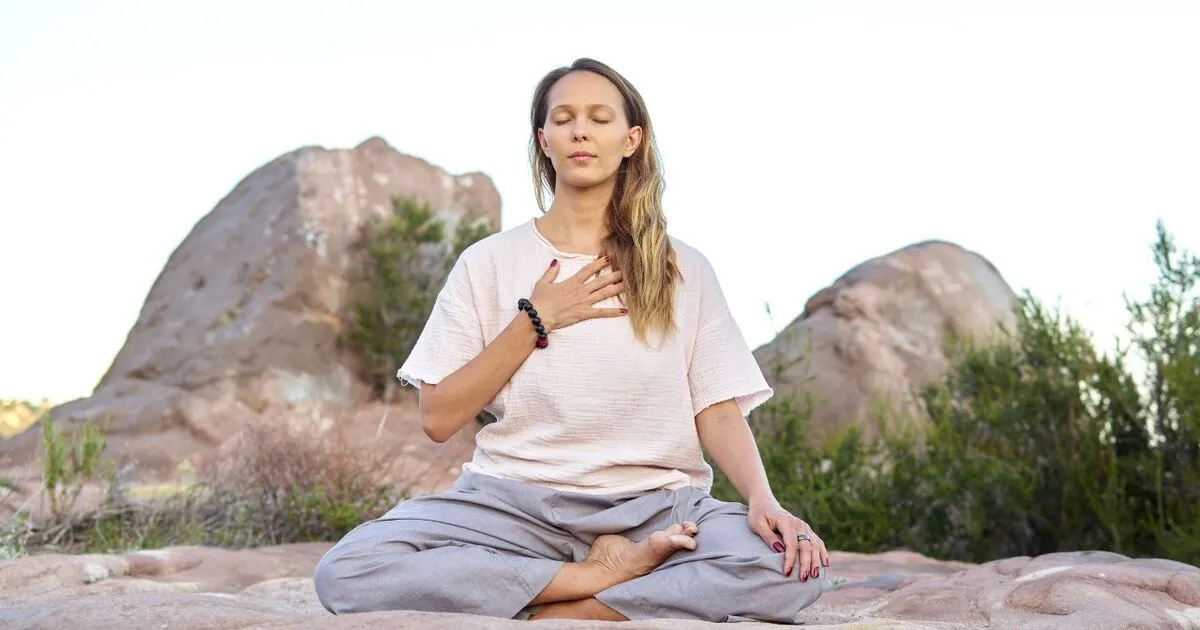Vipassana Meditation: What It Is, Benefits, & How to Practice It

Vipassana meditation, an ancient practice deeply rooted in Buddhist traditions, stands as a beacon of self-awareness and tranquility in our fast-paced world.
Emphasizing the art of being firmly anchored in the present moment, this meditation technique encourages a non-judgmental awareness of one’s thoughts and feelings. It’s about observing the ebb and flow of the mind without clinging to any particular thought or emotion.
The allure of Vipassana meditation lies in its simplicity and accessibility. Unlike practices that require elaborate setups or specific paraphernalia, Vipassana can be embarked upon with nothing more than a quiet space and a few moments of your time.
It’s a journey that begins with modest, five-minute sessions, gently expanding into longer periods of introspection as one grows more attuned to the rhythm of their inner world.
The benefits of this form of meditation are as profound as they are diverse. Practitioners often report enhanced concentration, a sense of calmness, and a crystal-clear clarity of mind.
These improvements collectively contribute to an elevated sense of well-being, making this meditation not just a practice but a transformative experience.
This technique, often referred to as insight meditation, offers a lens through which we can view our thoughts and emotions in a new light, leading to a deeper understanding of the self and a more harmonious existence.
As we embark on this exploration of Vipassana meditation, we uncover the layers of this practice, its impact on our lives, and how we can integrate it into our daily routines.
Join us in this journey of discovery, where mindfulness becomes not just a practice, but a way of living
Understanding What Is Vipassana Meditation?
Vipassana meditation stands as a pillar of spiritual and mental discipline, tracing its origins back to the very roots of Buddhism in India.
Revered as one of the oldest meditation techniques in the country, it is believed to have been a key practice of the Buddha himself, aiding him on his path to enlightenment.
The essence of Vipassana lies in its approach to mindfulness — a deep, objective observation of the mind and body, free from the tethers of attachment and aversion.
The Meaning and Purpose of Vipassana
In the rich tapestry of Buddhist philosophy, the term Vipassana translates to “seeing deeply” or “seeing things as they are.”
This profound interpretation goes beyond the superficial layers of perception, guiding practitioners toward a true understanding of reality. The journey of Vipassana is carved into three fundamental aspects: sila (moral conduct), samadhi (concentration), and panna (wisdom).
Each element is pivotal, interweaving to form a comprehensive path towards spiritual clarity and mindfulness.
Vipassana’s Approach to Mindfulness
At the core of Vipassana’s methodology is the cultivation of an acute awareness of self and the surrounding world. Unlike other meditation forms that may focus on specific tasks, images, or guided visualizations, Vipassana encourages a mindful observation of one’s breath — a practice known as anapana.
This act of breathing, simple yet profound, becomes a gateway to the present moment. As practitioners attune themselves to the rhythm of their breath, they learn to notice the subtle sensations that arise with each inhalation and exhalation.
This process is not about controlling or altering the breath but about observing it as a natural, ongoing event. Through such observation, Vipassana meditators develop an enhanced awareness of the present, fostering a deep connection with the here and now.
The practice becomes a mirror, reflecting the transient nature of thoughts and feelings, and revealing the impermanence that characterizes all aspects of existence.
Subscribe to Create Higher Vibrations!
Get Inspiration and Practical advice straight to your inbox.
The Distinctive Nature of Vipassana
What sets Vipassana apart from other meditation techniques is its emphasis on direct experience and personal insight. While methods like mindful breathing or visualization serve specific purposes, Vipassana embarks on a broader, more introspective journey.
It’s about peeling back the layers of our consciousness, uncovering the truths that lie beneath, and confronting the realities of our existence with open eyes and a clear mind.
Through Vipassana, practitioners are not just meditating; they are engaging in a transformative act of self-discovery. It’s a practice that doesn’t just change how we meditate, but how we live, perceive, and interact with the world around us.
Vipassana meditation thus emerges as a powerful tool, not only for achieving mindfulness but for living a life imbued with greater insight, balance, and peace.
Seven(7) Benefits of Vipassana Meditation
Vipassana meditation has garnered attention for its wide array of benefits, impacting both mental and physical health. Here are seven notable benefits that highlight the transformative power of this practice:
1. Decreased Stress
In our world where stress often seems like a constant companion, the calming effect of this meditation cannot be overstated. While stress is a natural reaction to life’s demands, its excessive presence can be detrimental.
Studies have shown that those who engage in Vipassana meditation experience significant stress reduction. This practice offers a valuable tool for managing stress, potentially serving as an alternative or supplement to traditional stress therapies.
2. Reduced Anxiety
Vipassana meditation has shown promising results in alleviating symptoms of anxiety. Research indicates that mindfulness training, including Vipassana, can lead to lower levels of anxiety and depression.
This effect persists beyond the training period, suggesting long-term benefits. Vipassana equips practitioners with coping skills, fostering a non-judgmental awareness of thoughts and feelings, thus reducing the intensity of anxious thoughts and offering greater emotional control.
3. Improved Mental Focus
The impact of Vipassana meditation on mental focus is multi-faceted. It enhances concentration by minimizing distractions, elevating awareness, and alleviating stress and anxiety.
These benefits collectively improve decision-making abilities and self-discipline. While Vipassana can be beneficial for those seeking to improve focus, such as in ADHD, it is not a standalone treatment but rather a complementary practice that can enhance overall mental clarity and productivity.
4. Increased Brain Plasticity
The benefits of Vipassana meditation extend to the brain’s physical structure and function. Regular practice can lead to increased brain plasticity, enhancing various cognitive functions.
This not only maintains brain health but also potentially slows down age-related cognitive decline. Studies demonstrate that mindfulness meditation, including Vipassana, can increase the interconnectivity between brain networks, indicating profound neurophysiological changes.
5. Improved Self-Esteem
Practicing Vipassana meditation can be a powerful method for boosting self-esteem. It encourages self-awareness, self-acceptance, and positive self-talk.
By reducing negative emotions and fostering calmness and focus, practitioners can unlock their potential, becoming more confident, assertive, and successful. The effects of Vipassana extend beyond mental health, contributing to personal and professional growth.
6. Improved Relationships
The practice of Vipassana meditation offers multiple advantages for personal and social relationships. It cultivates self-awareness, empathy, and compassion, essential for deep and fulfilling relationships.
By encouraging the letting go of attachments, prioritizing values, and establishing healthy boundaries, Vipassana can significantly enhance interpersonal dynamics and the quality of social interactions.
7. Addiction Management
Vipassana meditation can play a crucial role in addiction management. Integrating Vipassana with cognitive-behavioral therapy, as seen in Mindfulness-Based Relapse Prevention programs, has been effective in treating various forms of addiction.
The practice addresses the psychological, social, and emotional aspects of addiction, reducing cravings and lowering the risk of relapse. The Buddhist perspective on craving as a source of suffering aligns well with this approach, offering a path to less suffering and improved well-being.
With these seven benefits, it becomes evident that Vipassana meditation is more than a mere practice; it’s a pathway to a healthier, more balanced, and fulfilling life.
Whether it’s managing stress and anxiety, enhancing focus and brain health, improving self-esteem and relationships, or tackling addiction, Vipassana offers a holistic approach to well-being.
Practice of Vipassana Meditation
Engaging in Vipassana meditation is a journey that blends simplicity with profound introspection. Let’s explore how this practice is carried out:
Essential Vipassana Meditation Steps
Structure of a Typical Meditation Session
A typical Vipassana meditation session might look like this:
Overcoming Common Practice Challenges

Additional Ways to Practice
Incorporating Vipassana meditation into your routine can be a rewarding and enlightening experience. Remember, it’s about patience, practice, and being present in the moment.
Whether you’re sitting quietly or mindfully engaging in daily activities, each moment spent in Vipassana brings you closer to inner peace and awareness.
Locating a Qualified Vipassana Meditation Expert
Finding the right expert to guide you in Vipassana meditation is a crucial step in deepening your practice. Here’s how to find and choose the best professional for your meditation journey.
The Value of Expert Guidance
Having an experienced teacher like Vishnu Ra, with 15 years of practice and teaching in meditation, can be invaluable. An expert can provide tailored guidance, help you overcome challenges, and offer insights that deepen your understanding and experience.
They’re like a compass in your meditation journey, guiding you through the complexities and nuances of the practice.
Finding Skilled Practitioners
Selecting an Appropriate Expert
Professionals Who Can Help
Choosing the right expert in Vipassana meditation can significantly enhance your practice, leading to more profound insights and a deeper connection with yourself.
Whether through yoga teachers, mindfulness therapists, or specialized programs, the guidance of a skilled professional can be a transformative element in your meditation journey.

Personal Reflections on Vipassana Meditation
Vipa meditation isn’t just a practice; it’s a journey of self-discovery and growth. Here are some personal reflections and insights based on my experiences and years of guiding others through this transformative process.
My Personal Experience with Vipassana
Over a decade ago, I embraced Vipassana meditation and it has profoundly transformed my life. My journey intensified after completing the Yoga Alliance Teacher Training in Ashtanga Vinyasa meditation.
Since then, whether in counseling sessions, speaking engagements, or digital courses, I’ve been guiding others in this practice, sharing the tranquility and insight it brings.
Insights and Growth from the Practice
Advice for Beginners in the Practice
In my experience, Vipassana meditation is a powerful tool for anyone seeking a deeper understanding of themselves and the world around them.
Its impact on mental, emotional, and spiritual well-being is profound. Whether you’re just starting or have been practicing for years, every moment of meditation adds to a reservoir of peace, clarity, and insight.
Final Takeaway
As we reach the end of our exploration into the world of Vipassana meditation, let’s reflect on the key points we’ve uncovered and the profound impact this practice can have on our lives.
Summary of Key Points
Reflecting on the Significance of Vipassana Meditation
Vipassana meditation is more than a method; it’s a pathway to profound personal transformation. This practice offers a lens through which we can view our inner selves and the world with greater clarity and understanding.
It teaches us to observe without judgment, to embrace the present moment, and to cultivate a deeper sense of peace and awareness in our lives.
Encouraging Continued Exploration and Practice
Whether you are just beginning your journey or are a seasoned practitioner, the journey of Vipassana meditation is one of continuous discovery and growth.
I encourage you to keep exploring, practicing, and finding new depths in this practice. Remember, the path of Vipassana is not just about achieving a state of tranquility; it’s about enriching your entire life experience, one mindful breath at a time.
Vipassana meditation is a powerful tool that offers numerous benefits and can lead to significant personal growth and understanding.
Its practice is a journey of self-discovery, offering a way to navigate life with more mindfulness and equanimity. As we continue to explore and practice, we open ourselves to a world of inner peace and profound insight. 🌿🌼🌟
Namaste!



